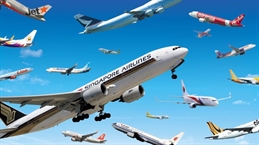
The recovery of the aviation industry in the Asia Pacific is being hindered by the region's slow vaccination progress — preventing countries to open up their borders, according to the Centre for Aviation (CAPA).
The Australia-based market intelligence firm for the aviation and travel industry said Asia's success at pandemic response if therefore being threatened by its vaccination progress.
"While other parts of the world are beginning to open up to international travel, in most of the key Asia-Pacific markets there is very little progress in restoring cross-border air traffic flows. This represents a major headache for Asian airlines anxiously waiting for revenue opportunities that could help spark recovery," CAPA said in an analysis.
It cited, for example, the progress in European countries which have been removing some international travel restrictions as their Covid-19 vaccination rates have reached high levels.
"But in the Asia-Pacific region, vaccination rates have generally been much slower. New waves of more infectious strains have also made Asian governments more cautious about opening borders, and in many cases even the gains made in domestic markets have eroded due to heightened restrictions," it said.
CAPA added that vaccination programmes are crucial to airlines' recovery hopes, as they are widely considered the best avenue for resuming travel. It said that when countries reach herd immunity vaccination levels of 70% or higher, their governments will have more options for removing restrictions.
Specifically, CAPA noted how vaccination rates remain low in Hong Kong, limiting recovery opportunities. In Japan, it said vaccination program is also slow, although the Japanese government is planning expansion.
It said Malaysia's domestic travel restrictions is also likely to remain through October and in Singapore, traffic is still at minimal levels, despite better vaccination rates with a standout vaccination rate as 43% of its population have received at least one shot and 32% fully vaccinated.
Nonetheless, CAPA said much like Hong Kong, Singapore's aviation industry has been particularly hard hit by the Covid-19 crisis due to its lack of a domestic network.
Citing Lim Ching Kiat, Changi Airport's managing director for air hub development, the market intelligence firm noted that Singapore is projecting that international traffic to not fully recover globally until "around 2023 or 2024" — although the gateway is looking at a near term interim goal of reaching 30%-50% of pre-pandemic levels in the next year or two.
APAC success in Covid-19 handling eroded by vaccination lag
Meanwhile, CAPA said the perceived success of the Asia-Pacific region in combatting the pandemic has changed dramatically, at least in relation to other regions.
It said last year many Asian countries were considered models to emulate as they managed to get the initial outbreak under control, while the pandemic swept through the U.S. and Europe.
"Now, countries in these regions have a high enough vaccination rate that they are able to remove many domestic restrictions, and even contemplate resuming international travel. But most countries in Asia remain much further away from that point," it said.
"Admittedly, many Asian nations do not have the same level of health services or resources as in Europe or North America, which makes vaccination rollouts more challenging. However, it is crucial that Asia-Pacific governments – and populations – display more urgency in ramping up vaccination levels," CAPA added.
It went on to say that even a much accelerated programme across the region would be unlikely to create a platform for even limited multilateral reopening of borders before the end of 2021.



